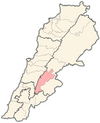|
Sawiri, Lebanon
Sawiri or Sawairy or es-Sawairi (الصويري) is a town in the eastern part of Lebanon. It is located in the West Bekaa District near the Syrian border, in the governorate of Beqaa in the foothills of the eastern mountains. Al-Masna (المصنع) is the main check point between the Lebanese & Syrian Borders and it is located in the territory of Sawiri.[1] HistoryIn 1838, Eli Smith noted it as Al Sawirah,الصويرة; a Sunni Muslim village in West Beqaa at the Beqaa Valley.[2] PopulationSawirah's population is over 20,000 people with many of its inhabitants having immigrated to the United States, Brazil, Argentina, Venezuela, Canada and France in the 1900s. The major surnames or families in Sawirah are Janbein, Amer, Berro, Balhis, El Smaily (Smaily or Smaili), Youssef, Abdel Razzak, Zeitoun, Shouman, Abou Nemry, Taleb, Shalaby, Abou Arab, Chebli, Tahan, Salha, Abdallah, Zrara, Almoghabbat and Saleh.[citation needed] Schools in SawiriUntil the early 1990s, SAWIRAH had only two schools (Makased School and SAWIRAH Official School) educating up to Grade 9. At that time, the Sawiris used to continue their high school education in the neighbour towns of their village and then their university studies in Beirut. SAWIRAH nowadays has three big schools which allow the students to pass the Lebanese Brevet Examinations (Grade 9). Sawiri has one high school (up to Grade 12) which is funded by the Lebanese Ministry of Education. This high school is called: SAWIRAH Official High School. It started in 2003.[citation needed] Agriculture in SawiriSawiri is an agriculture and service-oriented town. Most people own their land and come from a farming background. Sawiri produces lentils, figs, and Armenian cucumbers (mikthi). However, olive, Almond, nut and cherry trees have been grown rapidly as well as grape vines of all sorts in the last 3 decades. In the late 1990s, many "Sawiris" started growing peanut trees (Sterculia quadrifida) too.[citation needed] Sawiri's bordersSawiri extends from Beirut Damascus Highway at Masnaa border station to Manara town to the south and From the west, it borders Dakwee (Thakwee) mountains to the east all the way to Syrian Border through rugged heights. It is opposite the Tell Ain el Meten, a Heavy Neolithic archaeological site that was once used by the Qaraoun culture during the deforestation of Lebanon in prehistory. Some of the flints found at the site possibly date back to the Middle Paleolithic with other evidence of pottery from the Early Bronze Age and Middle Bronze Age.[1] References
Bibliography
External links |
||||||||||||||||||||

